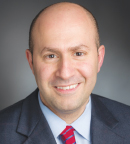A novel, first-in-class, small molecule, hypoxia-inducible factor 2 alpha (HIF2A) inhibitor showed single-agent activity in heavily pretreated patients with metastatic clear cell renal cell carcinoma. These results from a phase I/II study will be presented by Toni Choueiri, MD, and colleagues at the 2020 Genitourinary Cancers Symposium (Abstract 611).

Toni Choueiri, MD
Researchers reported a response rate of 24% across all risk categories of patients treated with MK-6482, which blocks new blood vessel growth that fuels kidney tumors. Based on these findings, a phase III trial has been launched.
“A new drug as a single agent showing an overall response rate of 24% across all risk categories—poor, intermediate, and good, and in a heavily refractory population—is quite promising,” said Dr. Choueiri, Director of the Lank Center for Genitourinary Oncology at Dana-Farber Cancer Institute and the Jerome and Nancy Kohlberg Professor of Medicine at Harvard Medical School.
Mechanism of Action
The drug targets a component of the body’s mechanism for sensing oxygen levels and turning on genes that enable the body to adjust to hypoxia by making more red blood cells and forming new blood vessels. The 2019 Nobel Prize in Medicine was granted for the discovery which unraveled this complex mechanism, which can be hijacked by cancer to help tumors survive and grow.
In the majority of patients with clear cell renal carcinoma, the tumor suppressor protein known as von Hippel-Lindau is not functional. As a result, hypoxia-inducible factor proteins accumulate inside the tumor cell, wrongly signaling there is a shortage of oxygen, and activating the formation of blood vessels, fueling tumor growth. Understanding this abnormal process has paved the way for new cancer drugs, MK-6482 being one of them. It is distinct in that it targets HIF2A directly, leading to blocking cancer cell growth, proliferation, and abnormal blood vessel formation.
“MK-6482 is well tolerated with a favorable safety profile and demonstrated promising single-agent activity in heavily pretreated patients with clear cell renal cell carcinoma across International Metastatic RCC Database risk groups.”— Toni Choueiri, MD, and colleagues
Tweet this quote
Phase I/II Results
The study of MK-6482 included 55 patients with advanced clear cell renal cell carcinoma who had an average of three prior lines of therapy.
After a median follow-up period of 13 months, the overall response rate was 24%, with 13 confirmed partial responses. Forty-one patients had stable disease, with a disease control rate of 80%. There were partial responses in 2 of 5 favorable-risk patients; 10 of 40 intermediate-risk patients; and 1 of 10 poor-risk patients.
The median duration of response had not been reached: 81% of patients had an estimated response of more than 6 months and 16 patients continued treatment beyond 12 months. The median progression-free response rate was 11 months.
The most common all-grade, all-cause adverse events (> 30%) were anemia (75%), fatigue (67%), dyspnea (47%), nausea (33%), and cough (31%). Anemia (26%) and hypoxia (15%) were the most common grade adverse events. No grade 4 or 5 drug-related adverse events were observed.
The authors concluded, “MK-6482 is well tolerated with a favorable safety profile and demonstrated promising single-agent activity in heavily pretreated patients with clear cell renal cell carcinoma across International Metastatic RCC Database risk groups.”
Disclosure: Funding for this research was provided by Merck Sharp & Dohme. For full disclosures of the study authors, visit coi.asco.org.

